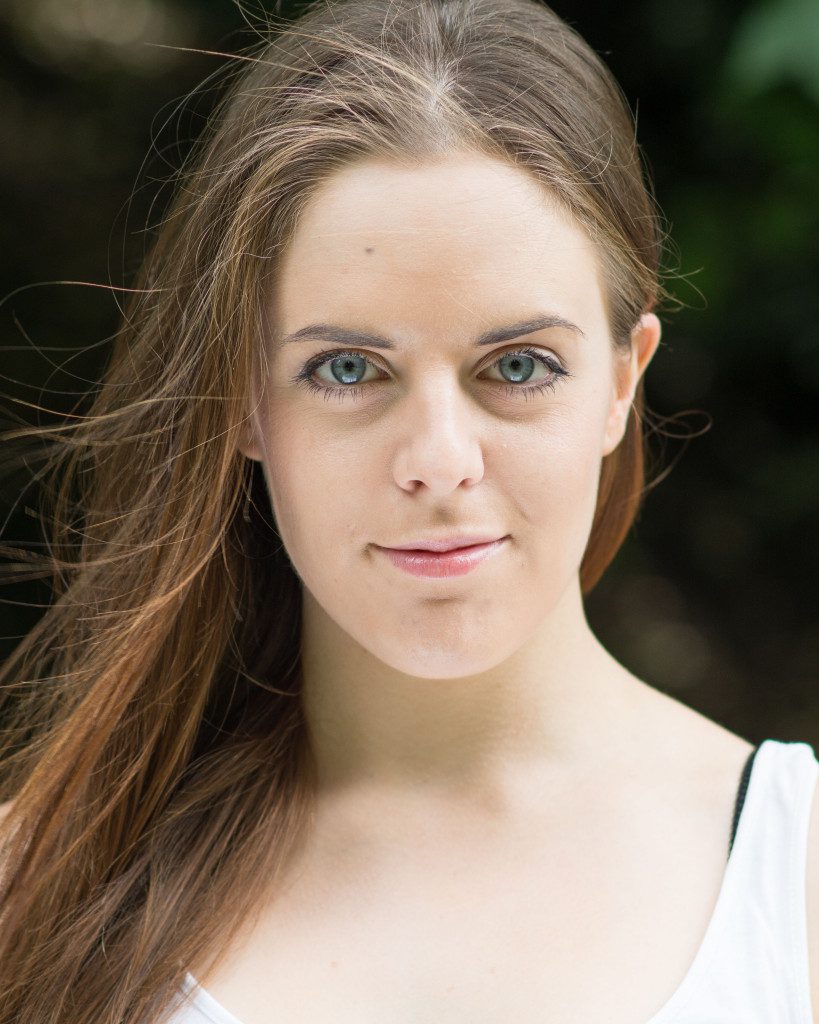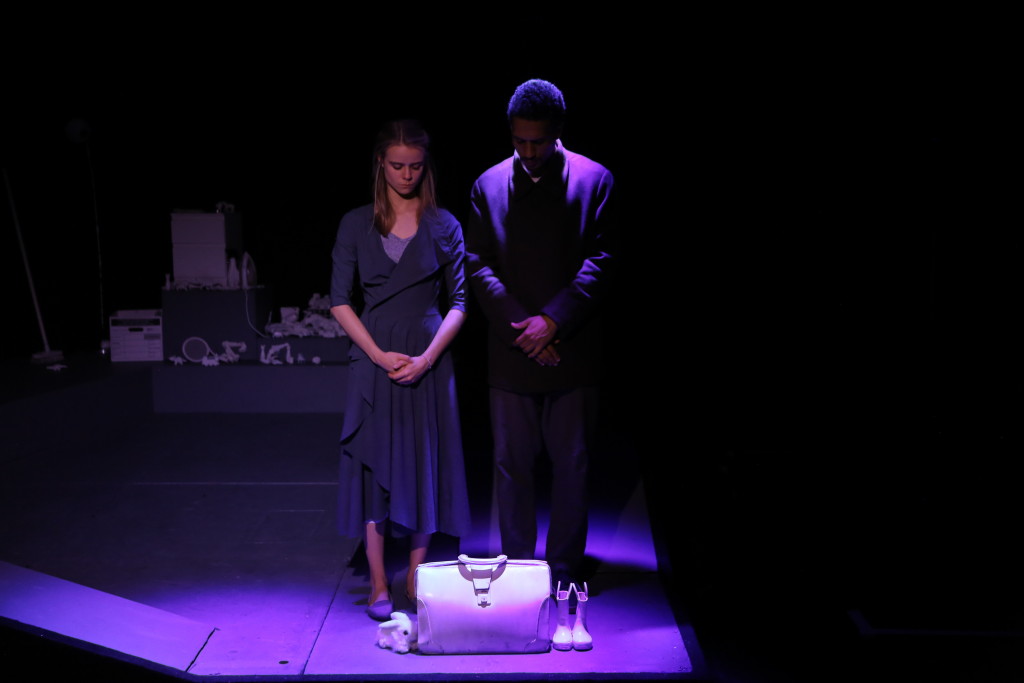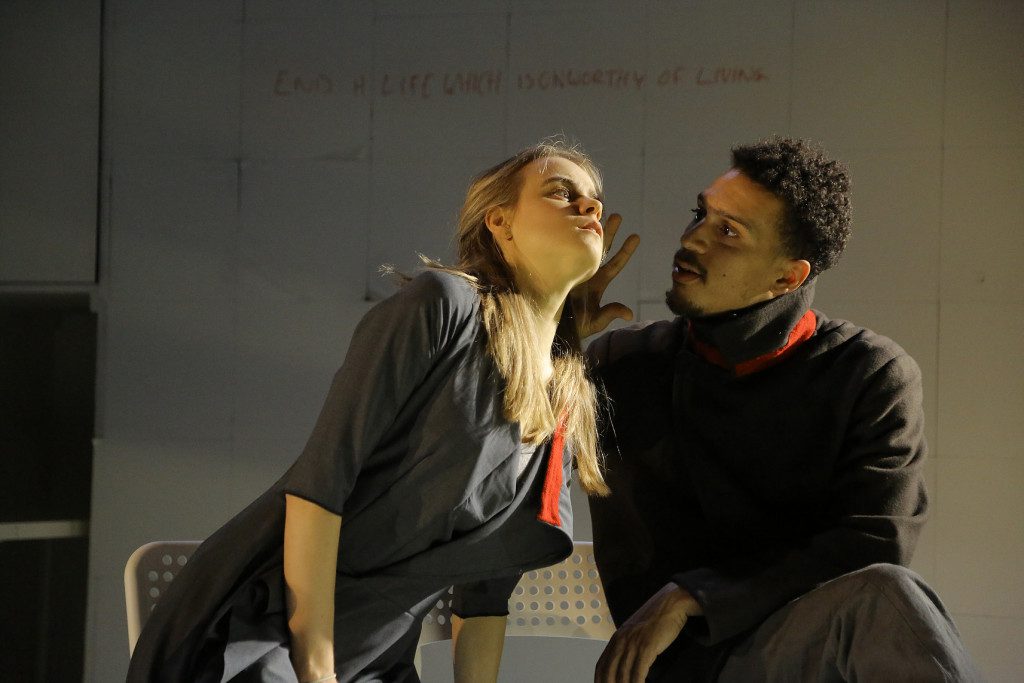Where:
The Venue, 101 Gwendolen Road, Leicester
Website:
Where did you first discover the play, and what was it about Kinder K that prompted your interest?
I was on placement during my second year as a directing student at Drama Centre London, and was recommended Company of Angels (now Boundless Theatre), as they were focusing on exciting international writing for young people, after having done readings of Danish plays at the Danish Embassy in London. I was researching Scandinavian plays for them to use for more readings, and one of them happened to be Kinder K.
I fell in love with the juxtaposition, how Kristofer phrased the question of what makes us human by looking at something so concrete as a couple expecting their first child, with the weight of Nazi Germany and the terror of Action T4 – the killing of thousands of disabled children – beside it. The play looks at empathy and what is humane in such a striking set-up. I thought it was a brilliant way of starting a conversation about some really important questions. The play looks at the humanity behind all these choices, while still talking about screening, gene-editing and what we think is a life “worthy of living”. It felt like such a unique experience reading it, that I couldn’t get it out of my head months after I finished my placement. I then knew I had to try to tell this story.

Camilla Gürtler
At first, the production was part of your Directing Showcase at Drama Centre London, and then it was programmed by the Bunker Theatre in London. Now, Kinder K is one of 16 plays that has been selected out of almost one hundred entries to be performed at National Student Drama Festival in Leicester. Why does Kinder K continue to be popular and relevant in the UK, do you think?
We’ve had an incredible response and interest, which I think partly comes from the play dealing with sensitive and important issues we haven’t discussed in this form before. It opens up for a debate on how we deal with disability and what makes us human, and it does so by showing these different people and their heart-breaking stories in a more abstract form. In Scandinavia, I think we aren’t afraid of addressing controversial issues, and I think the way this is reflected in the play’s subject matter and style of writing is refreshing to a UK audience. It can also be hard to be faced with, of course, but I think the playful form and imaginative staging helps us see it all in a new light.
The play doesn’t pick a side, but shows us the problems and uncertainties in a different way, which I think makes the subject more approachable. We can all look at the two couples and see their hopes, their pain, their search for the right answers as they try to decide what to do in the situations they’re in. But it’s never cold, I think – Kristofer writes with a lot of heart and an understanding of people, so I think all of their dilemmas and actions really move us.

Kinder K at Bunker Theatre. Photo: Fay Summerfield
Is there anything in particular about Scandinavian contemporary theatre that interests you, and do you think there is anything it can bring to the UK?
I’m excited about the way Scandinavian theatre combines a visual expressiveness and intelligence in staging, as well as having strong roots in new writing that isn’t afraid of putting a finger on society’s pulse and voicing what’s happening around us. It’s fearless but also poetical, and it feels like it has a very deep and rooted connection to a play’s emotional and symbolic landscape. There’s a lot of purpose in it, I feel, and a search for meaning.
I think it can bring some really powerful stories to the UK, told through the gut in a very exposing way that feels more emotionally raw. Its expressive visual language combined with the UK’s remarkable text and storytelling tradition is a combination I’m very interested in.
What are your ambitions for Kinder K after the festival?
We are hoping our taking part in the festival will create interest for Kinder K and a future run of the show. We’d like to bring it back to London for a full run and continue the participation work we started last year. At the Bunker we hosted a screening debate with ARC (Antenatal Results and Choices), The Down’s Syndrome Research Foundation, and writer Kristofer Grønskag, debating the ethical dilemmas in the play and answering questions from the audience. This play is so relevant now with talks of diversity and gene-editing being debated around the world, so we think it’s important it has a future life and opportunity to engage with a wider audience.

Kinder K at Drama Centre London. Photo: Fay Summerfield
Your recently established theatre company, Cut the Cord, has had a busy year. What are your plans for the NeXT?
We have had a busy year! We’ve been very lucky that Kinder K went to the Bunker, and that we afterwards had the opportunity to develop another play at The Old Vic Lab and then take it to Theatre Royal Stratford East for their Stronger Than Fear festival.
I’m in my Master year at Drama Centre London and will be doing my final show there in May. We’ll be working on the new Danish play ‘I Run’ by Line Mørkeby about a man who starts running the day his daughter dies of cancer. Only, he can’t stop. He runs for the entire performance trying to overcome his grief, and the play focuses on how we deal with the loss of a loved one and the taboo of depression.
We are very excited about continuing to promote Scandinavian theatre in the UK and hope this year will provide us with plenty of opportunities to share these with a UK audience!
Norwegian Art